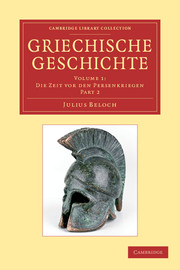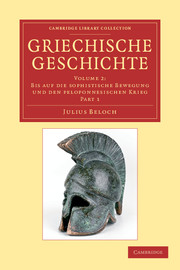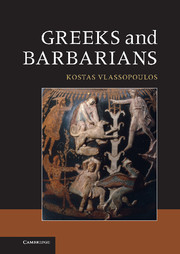Refine search
Actions for selected content:
23990 results in Ancient history
The Ptolemies, the Sea and the Nile - Title page
-
-
- Book:
- The Ptolemies, the Sea and the Nile
- Published online:
- 05 June 2013
- Print publication:
- 04 July 2013, pp iii-iii
-
- Chapter
- Export citation
Preface
-
- Book:
- The Family in Roman Egypt
- Published online:
- 05 July 2013
- Print publication:
- 04 July 2013, pp ix-x
-
- Chapter
- Export citation
Copyright page
-
- Book:
- The Ptolemies, the Sea and the Nile
- Published online:
- 05 June 2013
- Print publication:
- 04 July 2013, pp iv-iv
-
- Chapter
- Export citation
Bibliography
-
- Book:
- The Family in Roman Egypt
- Published online:
- 05 July 2013
- Print publication:
- 04 July 2013, pp 214-249
-
- Chapter
- Export citation
Figures
-
- Book:
- The Ptolemies, the Sea and the Nile
- Published online:
- 05 June 2013
- Print publication:
- 04 July 2013, pp vii-vii
-
- Chapter
- Export citation
Chapter 5 - Growing old in the household
-
- Book:
- The Family in Roman Egypt
- Published online:
- 05 July 2013
- Print publication:
- 04 July 2013, pp 107-140
-
- Chapter
- Export citation
Preface
-
- Book:
- The Ptolemies, the Sea and the Nile
- Published online:
- 05 June 2013
- Print publication:
- 04 July 2013, pp xiii-xiv
-
- Chapter
- Export citation
Chapter 2 - The Ptolemaic League of Islanders
-
-
- Book:
- The Ptolemies, the Sea and the Nile
- Published online:
- 05 June 2013
- Print publication:
- 04 July 2013, pp 19-38
-
- Chapter
- Export citation
Contributors
-
-
- Book:
- The Ptolemies, the Sea and the Nile
- Published online:
- 05 June 2013
- Print publication:
- 04 July 2013, pp x-xii
-
- Chapter
- Export citation
Chapter 8 - Conclusions
-
- Book:
- The Family in Roman Egypt
- Published online:
- 05 July 2013
- Print publication:
- 04 July 2013, pp 199-213
-
- Chapter
- Export citation
Map
-
- Book:
- The Family in Roman Egypt
- Published online:
- 05 July 2013
- Print publication:
- 04 July 2013, pp xi-xii
-
- Chapter
- Export citation
Tables
-
- Book:
- The Ptolemies, the Sea and the Nile
- Published online:
- 05 June 2013
- Print publication:
- 04 July 2013, pp viii-ix
-
- Chapter
- Export citation
Chapter 7 - Childless old age
-
- Book:
- The Family in Roman Egypt
- Published online:
- 05 July 2013
- Print publication:
- 04 July 2013, pp 162-198
-
- Chapter
- Export citation
Chapter 4 - Rhodes and the Ptolemaic kingdom: the commercial infrastructure
-
-
- Book:
- The Ptolemies, the Sea and the Nile
- Published online:
- 05 June 2013
- Print publication:
- 04 July 2013, pp 66-81
-
- Chapter
- Export citation
Chapter 9 - Aspects of the diffusion of Ptolemaic portraiture overseas
-
-
- Book:
- The Ptolemies, the Sea and the Nile
- Published online:
- 05 June 2013
- Print publication:
- 04 July 2013, pp 143-159
-
- Chapter
- Export citation
Chapter 6 - Ptolemaic grain, seaways and power
-
-
- Book:
- The Ptolemies, the Sea and the Nile
- Published online:
- 05 June 2013
- Print publication:
- 04 July 2013, pp 97-107
-
- Chapter
- Export citation
Chapter 6 - The patriarchal household and the incoming daughter-in-law
-
- Book:
- The Family in Roman Egypt
- Published online:
- 05 July 2013
- Print publication:
- 04 July 2013, pp 141-161
-
- Chapter
- Export citation

Griechische Geschichte
-
- Published online:
- 05 June 2013
- Print publication:
- 02 August 2012
- First published in:
- 1926

Griechische Geschichte
-
- Published online:
- 05 June 2013
- Print publication:
- 02 August 2012
- First published in:
- 1914

Greeks and Barbarians
-
- Published online:
- 05 June 2013
- Print publication:
- 01 August 2013
